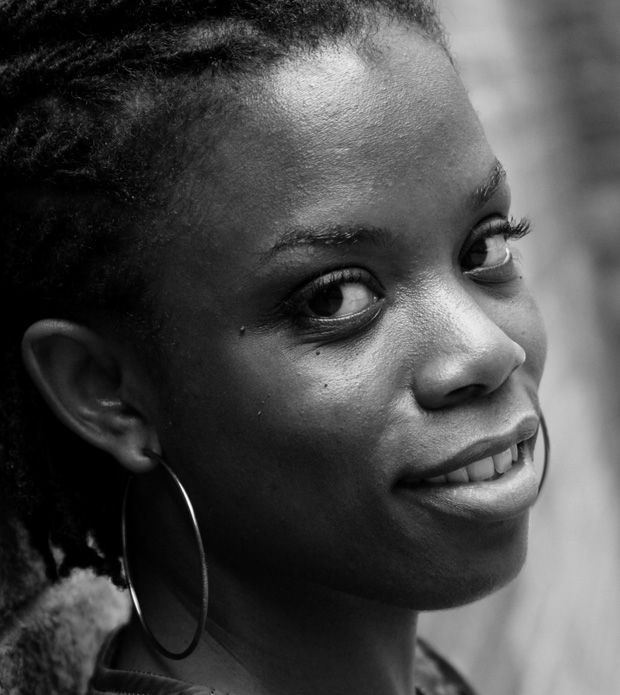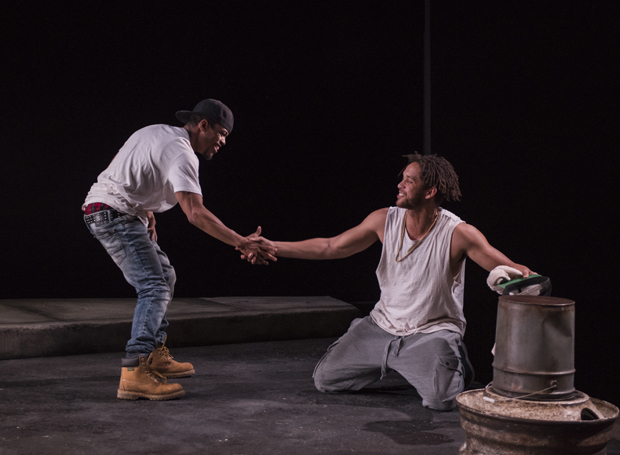Pass Over Goes From the Steppenwolf Stage to the Silver Screen
Antoinette Nwandu’s play sparked a national conversation upon its premiere. Now, before its New York debut, Spike Lee has created a film version.
It's been a whirlwind few months for the playwright Antoinette Nwandu. In June 2017, Chicago's Steppenwolf Theatre presented the world premiere of her play Pass Over. Described as "a mashup of the biblical Exodus story and Beckett's Waiting for Godot," the work follows two young black men on a nameless street corner as they dodge gunfire, a racist cop, and clueless bystanders, and dream of a way out.
The production, directed by Danya Taymor, sparked a national conversation about bias in the community of theater reviewers. It also ignited a flame within director Spike Lee, who, after the show closed last summer, decided to bring Nwandu, Taymor, and the original cast back together to film several performances. The result is a blistering screen work that retains the play's theatrical nature. The film version premiered at Sundance and is currently streaming on Amazon Prime.
"It all happened pretty quickly," admits Nwandu, who makes her New York debut with the play's LCT3 premiere this summer. "A whirlwind is exactly how I describe it."

(photo provided by Steppenwolf)
This interview has been condensed and edited for clarity.
What was the impetus for writing Pass Over?
I wrote the play while I was teaching full-time at Borough of Manhattan Community College, which is part of the CUNY system. I was emotionally responding to the uptick in visibility of violence and, in many cases, murderous interactions between black men and the police. Obviously, sometimes it's not the police, like in the Trayvon Martin case, but someone who felt called upon to act in that role. My consciousness was being raised by the fact that a lot of those cases are still happening, and I was teaching young men who fit that profile, given the student body at BMCC. It was sobering and frustrating.
I think the core engine for the play was, really, anger and a feeling of helplessness. I'm taking those emotions and widening and broadening them to investigate this moment in the black experience through the lens of two young men.
During the Steppenwolf run, this play sparked a lot of tough conversations. Why and how are discussions like that vital to this particular work?
Steppenwolf and Lincoln Center are not necessarily the places where you think this play would happen, and that's been super important to the conversation between play and audience. To the theatergoing audience, which is, for the most part, white and upper-middle-class, the play is saying, "This is happening in your country and you have the power to change it." And the thing I wanted to happen in the theater did happen. People owned it as their own place.
One of the most thrilling conversations I had…The Steppenwolf development team put me in contact with a gentleman who was a Holocaust survivor. He owned up to the fact that he saw the name of the play and thought it was about something very different. He was like, "I'm sitting there and watching it and I thought I made a mistake. This is not about my experience." But afterwards, he was like, "It was my experience. You were telling my story." That was really affirming in this beautiful, tragic, deeply impactful way.
I'm really grateful that these institutions have opened up their doors to having this conversation and how explosive it is.

(© Michael Brosilow)
How did Spike Lee come into the equation? Did he see it during the initial run?
No, it was even crazier than that. The production at Steppenwolf had closed and he never saw it. But we're both represented by ICM, so someone internally passed it to him and said, "You need to read this." He called me up, which was pretty crazy, and said, "I want to film this," and I was like, "I don't understand what that means." I had seen his filmed theatrical performances of Passing Strange and Rodney King and rewatched them. This is something he does, so it wasn't totally out of the blue. Then we were off to the races.
Were there many changes that you had to make internally to suit the different medium?
There were some practical things. He was very interested in place as a director and storyteller. In the film, you see the street signs, 64th and MLK, that very specifically locate the characters, Moses and Kitch, in Chicago. He had some people doing research and they said at one time that that was one of the most deadly street corners in Chicago. It changes the piece, but it works for the filmic experience that they are rooted in a very specific place. In the play, it's a little more Beckettian: This is a street corner and you don't really know where it is.
The next journey for Pass Over is Lincoln Center Theater's LCT3. Is this your New York debut?
It is, actually. I've been in New York doing the off-off, off-off-off-Broadway thing for a very long time. Steppenwolf was so special, obviously, but finally getting that professional debut in New York is everything. It's what I've been dreaming about for the better part of a decade. It's great to have that happen, and Evan Cabnet and Natasha Sinha at LCT3 have done such a great job supporting the vision and the work. I'm excited.









